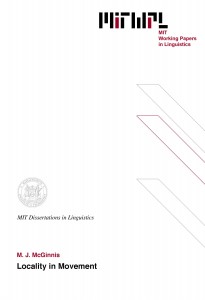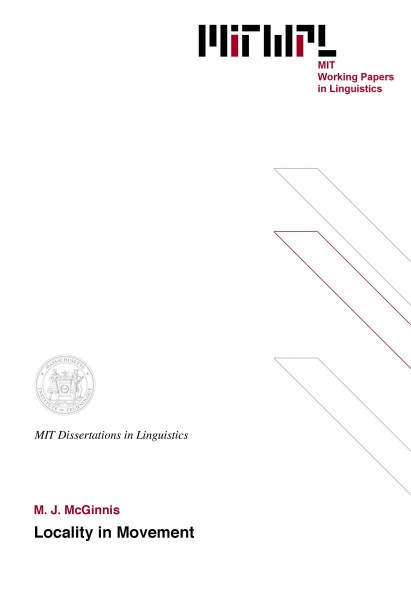Locality in Movement
M. J. McGinnis, 1998
In this dissertation, I demonstrate that the feature-based Attract theory of syntactic movement solves several empirical challenges for Relativized Minimality, while incorporating its key insights. Chapter 1 introduces the theory of phrase structure, syntactic movement, and abstract Case to be adopted throughout the dissertation. This chapter also lays out a cross-linguistic typology of possibilities for A-movement to the subject position.
Chapter 2 concerns cases of advancing, where the argument generated highest is attracted by the feature (EPP) driving movement to the subject position. Here locality interacts with a condition (Case Identification) preventing an argument from "pied-piping" to check EPP if it checks Case elsewhere. In some instances, advancing is forced jointly by locality and Case Identification. Given two equally local arguments, Case Identification determines which can be attracted to the subject position. However, newly identified "superraising" violations support the view that locality is respected even if the highest argument has already checked Case.
In the first part of Chapter 3, I argue for the central empirical proposal of this dissertation, Lethal Ambiguity: an anaphoric dependency cannot be established between two specifiers of the same head. I contend that one argument can A-scramble past another only by entering, or leapfrogging through, a multiple-specifier configuration with it. In either case, no anaphoric dependency can be established between the two arguments. In the second part of Chapter 3, I present cases of leapfrogging in A-movement to the subject position, also subject to Lethal Ambiguity.
Chapter 4 extends the empirical coverage of Lethal Ambiguity to answer a long standing question from the literature - namely, why anaphoric clitics cannot be object clitics. I argue that Lethal Ambiguity rules out the object clitic derivation from anaphors because an anaphoric object checks Case in a multiple-specifier configuration with the would-be antecedent. I adopt a passive-like derivation for the well-formed anaphoric clitic construction, where the clitic is a categorially underspecified external argument. Since this argument cannot be attracted to check Case or EPP, the object can skip over it to the subject position without Lethal Ambiguity arising. The remainder of the chapter is devoted to other potential cases of skipping.
Thesis Supervisor: Alec Marantz
Title; Professor of Linguistics
Table of Contents
Chapter 1 Locality and case 13
1 Feature-based locality 14
2 Locality and case 23
2.1 Move-a 25
2.2 Attract F 30
3 Cross-linguistic variation 40
3.1 Case suppression 41
3.2 Varieties of Case 46
4 Equidistance and superraising revisited 57
5 Outline of the thesis 61
Chapter 2 Advancing 63
1 Transitives 65
2 Double object constructions 68
2.1 Short passives 69
2.2 Passive alternations 77
3 Dative subjects 80
4 Absolute locality 89
5 Summary 99
Chapter 3 Leapfrogging 101
1 A-scrambling 102
1.1 Movement into multiple specifiers 108
1.2 A-scrambling obeys locality 113
1.2.1 Advancing of idiom chunks 116
1.2.2 Leapfrogging of idiom chunks 119
1.2.3 Leapfrogging and floated quantifiers 121
1.2.4 Against skipping 123
1.3 Summary 125
2 Lethal Ambiguity 126
2.1 Japanese 128
2.2 Georgian 131
2.3 Hindi 135
2.4 Scrambling into spec-RP 136
3 Leapfrogging to the subject position 139
3.1 Long passives 142
3.1.1 Obligatory long passives 143
3.1.2 Symmetric passives 146
3.2 Structural/inherent alternations 149
3.3 Clitic doubling 155
4 Overt movement of a lower argument 163
Chapter 4 Skipping 171
1 Anaphoric clitics 172
1.1 Transitives with an anaphoric clitic 174
1.2 Indirect objects 177
1.3 Anaphoric clitics and ECM verbs 184
1.4 Arbitrary agents 185
1.5 C-command and binding 192
2 Raising in English 198
2.1 The experiencer c-commands the embedded clause 201
2.2 The embedded subject raises past the experiencer 209
3 Ditransitive unaccusatives in Georgian 215
4 Summary 217

